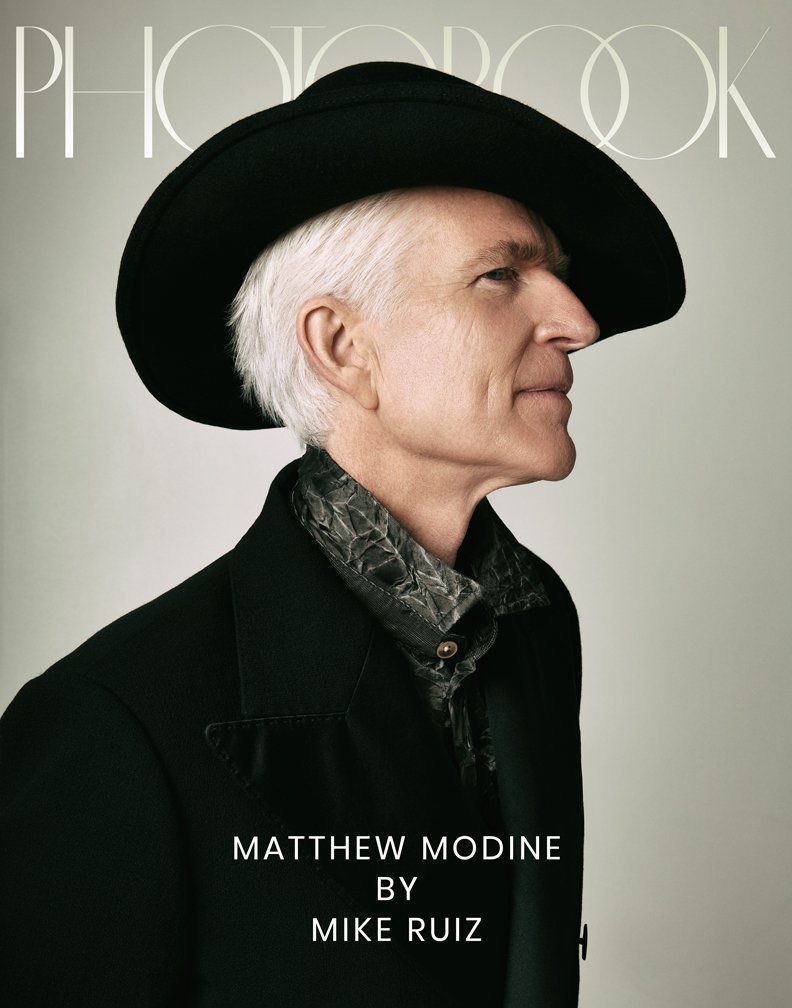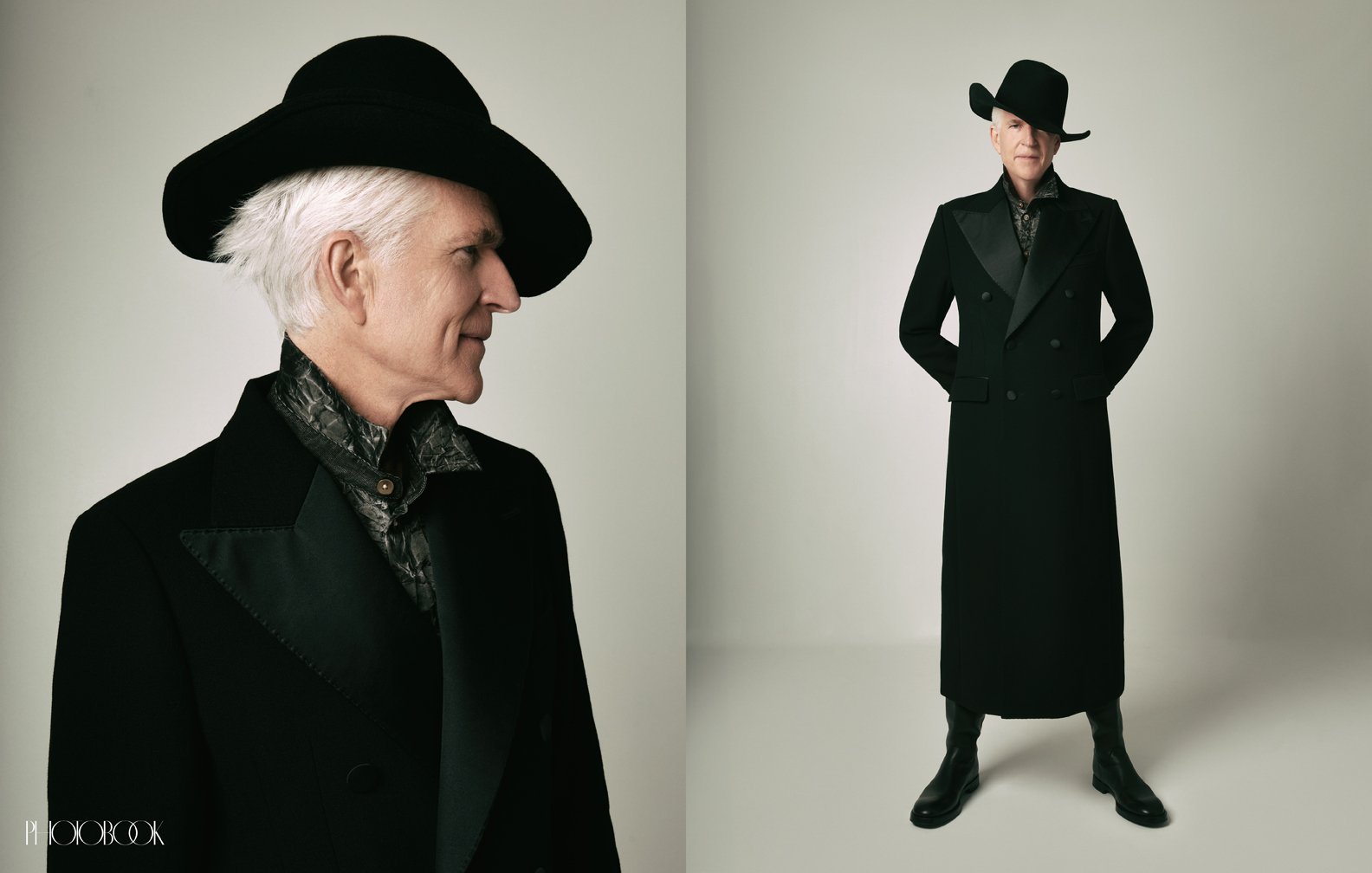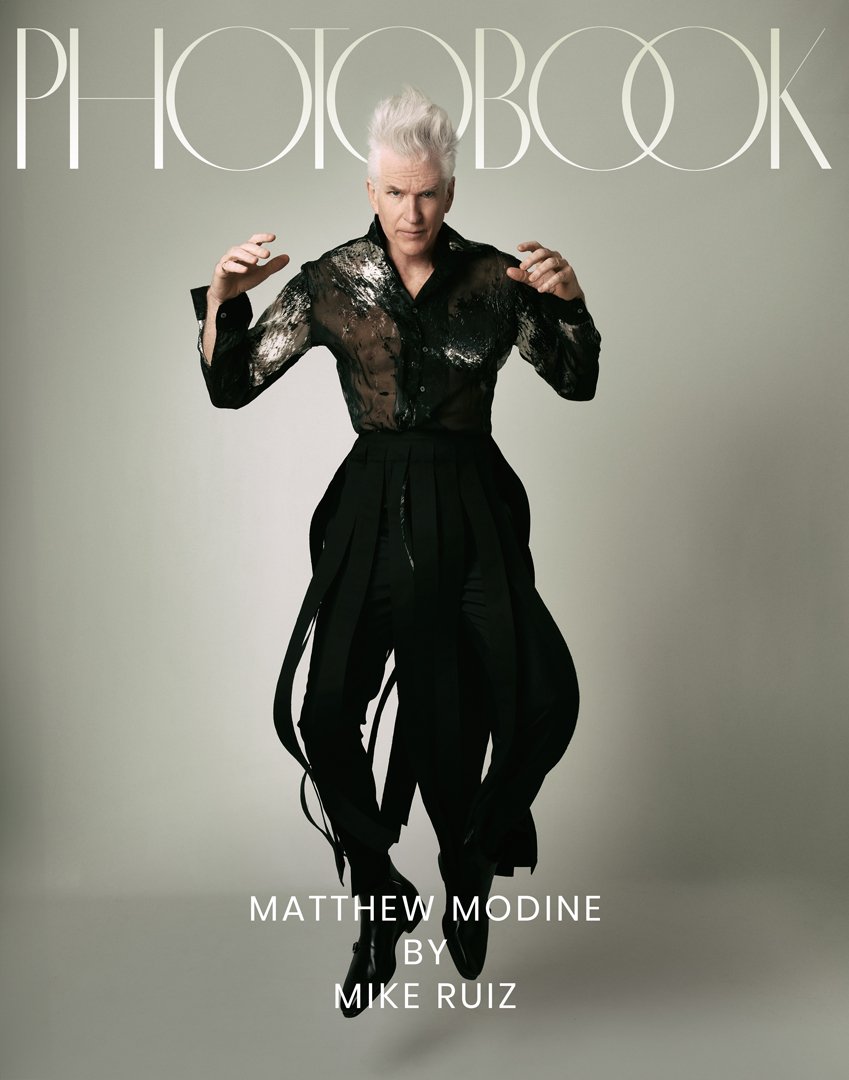Matthew Modine
Moviesac Insert and Squattoman in Obsidian Phur by Lovesac
Reversible nylon and faux fur jacket by Dolce & Gabbana
Faux fur jogging pants by Dolce & Gabbana
Nappa leather Mega Skate sneakers by Dolce & Gabbana
This interview and photoshoot were conducted before the current SAG-AFTRA strike.
Matthew Modine is an American actor who has taken on various roles in different genres that have introduced him to new audiences. From his early career as Private Joker in Stanley Kubrick's “Full Metal Jacket.” Since then, he has been involved in any projects that highlight his versatility and talent, such as “Stranger Things,” “Downwind,” “Oppenheimer,” and the passion project, “The Martini Shot.” Modine also continues to express his love for acting and the creative approach to film through writing and directing.
Double-breasted Stretch Wool Crepe coat by Dolce & Gabbana
Wool Felt Fedora Hat by Dolce & Gabbana
Straight Leg Wool Pants by Dolce & Gabbana
Shirt by FRIED RICE®
What early experiences in the entertainment industry inspired you to become an actor?
Wow, there have been so many influences. Certainly, my father being a drive-in movie theater manager had a gigantic influence on my early life and development. I had a steady diet of films that other kids my age had no access to. And the films I was seeing were projected onto an enormous outdoor movie screen. Seeing films in that forum, so much bigger than life, surely had an impact. As a young boy, I enjoyed the simple structure movies presented. I assumed that problems, the many difficulties of life, could and would be solved in a similar fashion to how a 90 or so minute film presented. But real life is so messy. Film life is so much more orderly and structured. A film begins by presenting a problem to the viewer, then identifies a suitable character to solve the problem. Then we, the audience, sit back and watch the problem be solved. Love triumphing over hate. Good triumphing over evil. Justice overcoming injustice. These are common themes in films. I was growing up in the 1960s and 70s when there was so much confusion: the Vietnam war, drugs, the war on drugs, political corruption. It was hard to know who was telling the truth because so many people were lying. Sadly, not so dissimilar to today. Growing up, I found comfort in movies and how there was a place you could go where problems were solved and love could overcome hate. I still do.
How do you feel that your approach to acting has changed over the years through different projects?
No one has ever asked me that question. Acting has no single recipe. There are lots of acting “cookbooks" that offer different recipes but there is no concrete answer for how to do it, except to do it. I could explain how to do a perfect swan dive off the cliffs of Acapulco, but the only way you’re going to do it, is to actually do it. Same with performance. Acting means, by definition, to do. So, you gotta do it. Performance and art are no different from all forms of life, they continue to evolve, change, transform. It’s interesting to watch old movies to see how acting styles have developed over the years. It’s fun to watch silent films and study the behavior of actors “indicating” through physical behavior what their characters are attempting to say without dialogue. Performing styles in theatrical productions may have changed and grown more radically than performances in film and television. But the core genuineness of a performance always comes from a foundation of emotional truth. How that truth is expressed is the art of the individual performer.
Double-breasted Stretch Wool Crepe coat by Dolce & Gabbana
Wool Felt Fedora Hat by Dolce & Gabbana
Straight Leg Wool Pants by Dolce & Gabbana
Leather Boots by Dolce & Gabbana
Shirt by FRIED RICE®
What past project has taught you the most about yourself?
Each of the projects has been instructive. I’m grateful for that.
What is some career or non-career advice you wish you had been told when you started your acting career?
To trust your first instinct. Sometimes our first thought is the best thought. But not always. And that change is constant.
What is the most challenging part about approaching a new character?
That is always the same. Asking myself “Why is the character saying these words?” This leads you to understanding what the character wants. What he may be hiding. What he desires. The “why” leads you to the “what” and the what leads you to the character.
Left:
Coat + Top by FRIED RICE®
Carbone Wool Blend One Pleat Trousersby ZEGNA
Boots by MAGNANNI
Right:
Top + Fringe Belt + Pants by KYLE'LYK
Boots by MAGNANNI
Tell us about your short “I Am What You Imagine” and the inspiration behind its creation.
The text for “I Am What You Imagine” is from a hypnagogic dream: that conscious moment during the onset of sleep. Sometimes it’s called lucid dreaming. The entire story came to me in that state of mind. I had just flown from New York City to Warsaw, Poland. I was exhausted and had to wake up in a few short hours to work and I was desperate to sleep. A voice kept pestering me: it was a calm voice saying those very words in the film. I thought, if I sat up and wrote them down, maybe the voice would release me and let me get to sleep. Years later, my daughter, Ruby Wylder, was looking through some of my diaries and came upon the text. It was her idea to make it into a film and to cast the amazing and wonderful Leon Vitali to play the voice opposite her.
How does the score of “I Am What You Imagine” assist in conveying its message?
Music is the most powerful communication tool in the world. It rises above time, language, race, politics, and is universally understood because of the emotions it has the ability to conjure up. As a co-producer of the film and a gifted musician herself, Ruby employed Kevin J Grossmann, a musician she frequently collaborates with, to create an emotional and expressive score. It was critical for the music to be invisibly present. Not to overpower, but to passionately transport the viewer.
Reversible nylon and faux fur jacket by Dolce & Gabbana
Faux fur jogging pants by Dolce & Gabbana
Nappa leather Mega Skate sneakers by Dolce & Gabbana
What was your favorite part about writing and directing your short “ I Am What You Imagine?”
Working with each of the film's incredibly talented artists. Terence Ziegler, the editor, and I have collaborated several times. His contribution to the visual effects in the film is unparalleled. Everyone you see mentioned in the final credits of the film, especially my producing partner, Adam Rackoff, volunteered to contribute precious time and their many talents, for the pleasure of connecting our story with an audience.
Tell us about your passion project, “The Martini Shot,” and its deeper meaning.
“The Martini Shot” is kind of like an experimental film. Before it, I’d never read nor seen a script quite like it. My wife, Cari, read the script and immediately told me I had to play the character. Like “I Am What You Imagine,” “the Martini Shot” is concerned with human existence. It doesn’t come right out and ask, “Who are we?” “How did we get here?” “What happens when I die?” But it does, in a quirky way, explore these questions in a way that is unique to the film. The writer and director, Stephen Wallis, is as peculiar as the film he made. And I think he will be happy for me to describe him like that. It was a pleasure working with Wallis and the amazing cast with which I’m honored to share the screen.
From “Downwind” to “The Accidental Truth,” what drew you into being part of this documentary style of projects?
My family grew up in the California desert and like millions of other people who lived, worked, or were near the nuclear testing ground, died of cancer. My grandfather, my uncle, and my father. As the film says, “We are all downwinders.” And we should all understand that and also have knowledge of what being a downwinder implies. Globally, there have been well over 2,000 nuclear bombs tested since the Trinity test. As my brother Maury Modine said, while being handcuffed and arrested for protesting the testing, “They know they work, why do they need to continually test them?” Maury’s simple question might be the smartest I’ve ever heard regarding the insanity of senselessly exploding these monstrous bombs.
“The Accidental Truth” is a story about the unknown. We humans like to think we are the tip-top of the food chain, the smartest species on the planet. But there is SO much we don’t know. “the Accidental Truth” explores an enormous gap which we perceive to be empty.
Tell us about your experience working on the set of ”Stranger Things,” and playing the role of Dr. Martin Brenner.
What’s to tell!? First of all, I can’t say because I was forced to sign a nondisclosure agreement. Dr. Brenner, or Papa, is as elusive and complicated as a Netflix series contract. What I will cherish is the life experiences I enjoyed behind the scenes. I love Matt and Ross Duffer and hope to work with them again. Ditto Shawn Levy. And my friendship (and godfather status) with MIllie Bobby Brown and her family is a friendship that my wife and I will enjoy for the rest of our life.
What has been your favorite project you have worked on?
The answer to that is always "The next one I’m working on.” I’ve had so many wonderful experiences in my work and in my life. I always look forward to the next day, the next opportunity, to being my new favorite.
Though different in meaning, “Retribution” and “Stranger Things” are both intense thrillers that keep you on the edge of your toes.
Thank you, I’ve never heard that expression, “The edge of your toes.” I like it.
What do you like most about being a part of these emotion-evoking projects?
I suppose that brings us back to your first question. I like how these projects present a problem and then watching how each of the storytellers weave the web and, as you say, keep you on the edge of your toes.
What has your experience been after “Stranger Things,” being introduced to a whole new demographic and younger audience?
I’m incredibly grateful to have been invited to the Duffer Brothers' “playground.” Because of their creation, I’ve found a whole new generation of young people, from all around the world, that know my professional work and are now discovering the work that I did long before putting on the elegant suit and tie of ‘Papa’. That’s a blessing.
What kind of projects would you like to participate in in the future?
I enjoy characters that solve problems rather than those that are responsible for creating them. I’ve just finished over 250 performances in London’s West End portraying Atticus Finch in Aaron Sorkin’s adaptation of Harper Lee’s “To Kill a Mockingbird.” I am grateful to Sonia Friedman for making that production as wonderful as it turned out to be. I could and would be happy to play characters like Atticus Finch for the rest of my professional career.
What upcoming or current projects are you excited for people to see?
“The Martini Shot,” “Hard Miles,” “I Am What You Imagine,” “Accidental Truth,” “Retribution,” “Downwind,” and “Sludge.” I’m very happy with these films, and I hope they will resonate with your readers. .
Social Media.
Instagram: @matthewmodine
CREW CREDITS:
PhotoBook Editor-In-Chief: Alison Hernon
PhotoBook Creative Director + Photographer + Producer: Mike Ruiz + @mikeruiz.one
Talent: Matthew Modine
Fashion Stylist: Alison Hernon at Exclusive Artists
Hair: April Barton for Suite303
Makeup: Deney Adam
Fashion Stylist Assistant: Skylar Elizabeth
Fashion Stylist Interns: David Tongi, Ambrosio Gonzales, Madison Cannella
Tearsheets by Daniel López, Art Director, PhotoBook Magazine
Interview by Renata Salazar, Contributor, PhotoBook Magazine










